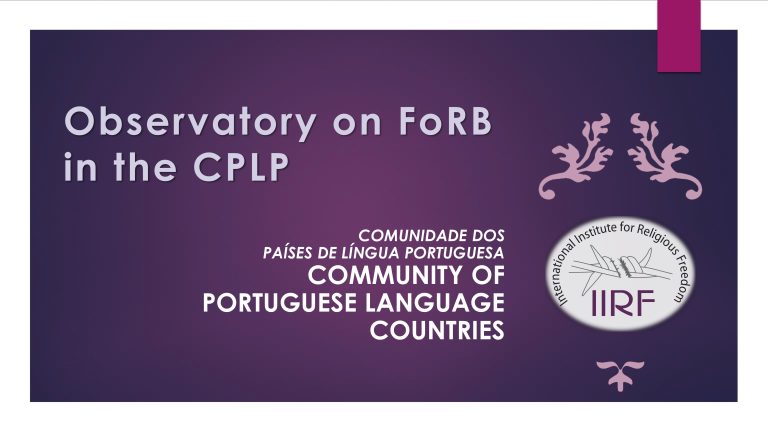
An “Observatory on FoRB in the CPLP”, the Observatory on Freedom of Religion or Belief in the Comunidade de Países de Língua Portuguesa (Community of Portuguese Speaking Countries), is currently in the process of being implemented by the International Institute for Religious Freedom (IIRF) under the leadership of Dr. Fernando da Silva, a Portuguese who is active with universities in Mozambique, Angola, South Africa and Portugal.
The IIRF now made the proposal public – it is available for the media for download now. The Associate Secretary General of World Evangelical Alliance, being among other things responsible for interreligious dialogue and religious freedom advocacy of this network of 600 million Protestants, presented this plan originally to a wide UN audience in Rabat, Morocco, in December 2017. During his stay in Rabat, Schirrmacher met three ministers of the Royal Government of Morocco, Mustafa Al-Ramid, Minister of Justice and of Human Rights, Ahmed Taoufiq, Minister of Habous and Islamic Affairs, and Nasser Bourita, Minister of Foreign Affairs and International Cooperation.
This is how the website of the Office of the United Nations High Commissioner for Human Rights (OHCHR) describes the event:
“The Rabat Plan of Action on the prohibition of advocacy of national, racial or religious hatred that constitutes incitement to discrimination, hostility or violence. The Rabat Plan of Action brings together the conclusions and recommendations from several OHCHR expert workshops on the prohibition of incitement to hatred (held in Geneva, Vienna, Nairobi, Bangkok and Santiago de Chile).
The Rabat Plan of Action, which was adopted by experts at the wrap-up meeting in Rabat on 4-5 October 2012, is available in English, French, Arabic and Bangla.
It suggests a high threshold for defining restrictions on freedom of expression, incitement to hatred, and for the application of article 20 of the ICCPR, by outlining a six-part threshold test which takes into account the context, speaker, intent, content, extent and likelihood.
On the occasion of the fifth anniversary of the Rabat Plan of Action, more than 100 States, national human rights institutions, regional organizations, religious authorities and faith-based civil society actors participated in the Rabat+5 symposium (6-7 December 2017). In his opening statement, the High Commissioner urged the various stakeholders to implement and support concrete ‘Faith for Rights’ projects, notably at the grassroots level. During the Rabat+5 symposium, sixteen civil society organizations and OHCHR’s Regional Office for Middle East and North Africa presented their projects and areas of future cooperation on combatting discrimination on the basis of religion and enhancing the role of faith-based actors in the defence of human dignity:
- Mr. Melhem Khalaf, Lebanon
- Ms. Katherine Cash, Sweden
- Mr. Masimba Kuchera, Zimbabwe
- Ms. Elizabeth O’Casey, Belgium
- Ms. Ani Zonneveld, United States of America
- Mr. Andrew Smith, United Kingdom of Great Britain and Northern Ireland
- Ms. Tahmina Rahman, Bangladesh
- Ms. Salpy Eskidjian, Cyprus
- Mr. Yehuda Stolov, Israel
- Mr. Thomas Schirrmacher, Germany
- Ms. Zainah Anwar, Malaysia
- Ms. Diane Alai, Switzerland
- Mr. Abdelwahab Hani, Tunisia
- Mr. John Graz, France
- Mr. W. Cole Durham Jr., United States of America
- Mr. Said Hammamoun, Canada
- Mr. Ismail Zien, OHCHR Regional Office for Middle East and North Africa
- Ms. Gaby Herbstein, Argentina
The Rabat+5 symposium offered an opportunity for the various stakeholders to engage with several experts who had contributed to the elaboration of the Rabat Plan of Action and the 18 commitments on ‘Faith for Rights’ and to hear experiences in the area of combatting violence in the name of religion, both by State representatives, national human rights institutions and civil society actors. The participation of a number of mandate holders of international human rights mechanisms also enriched the discussions at the Rabat+5 symposium from a human rights perspective.”